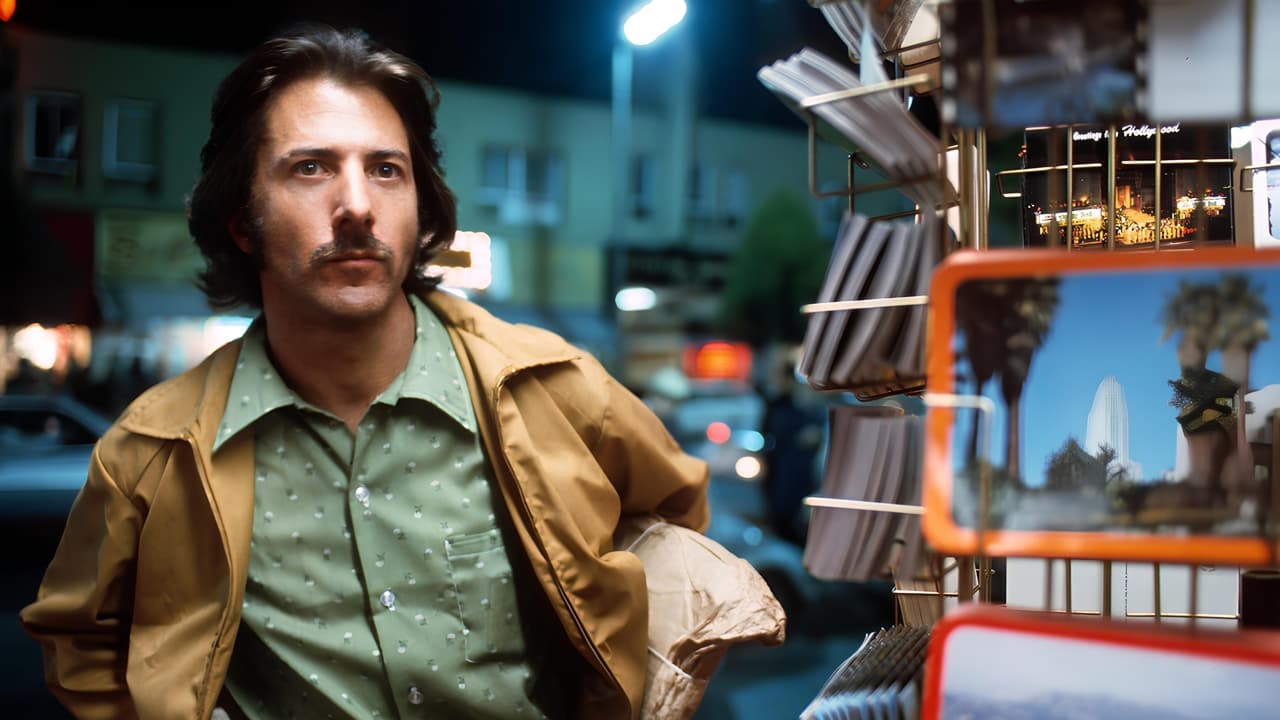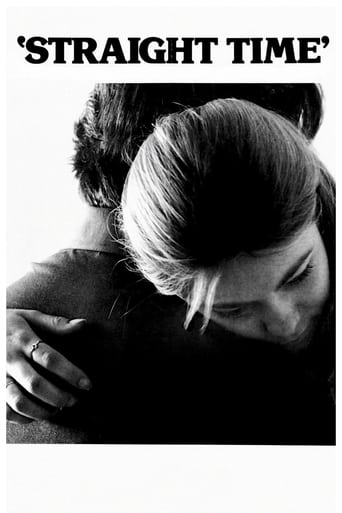

. . . American womenfolk against the Real Life threats posed by its lead actor? Some people will view STRAIGHT TIME as only that, seeing as how the beleaguered Dustin Hoffman's "Max Dembow" character man-handles the soft-hearted "Jenny," after drinking directly from the quart carton of milk in her refrigerator and just before stealing her baby blue Mustang convertible. An actor who would agree to play a misogynist doing all of this surely has a screw loose; no one would trust such a jerk with their own daughter in Real Life. However, many perceptive viewers have realized that Warner Bros. is extending a warning to we folks of the future that the white female voting demographic--such as STRAIGHT TIME's Jenny--cannot be trusted at the ballot box. In a country that has given this group Title IX, Choice, and ObamaCare, most of them will gravitate to the Max-like "bad boy" (the worse the better) in preference to one of their own, such as Elizabeth Warren, Jane Fonda, or Hillary Clinton. Just wait, Warner warns the USA, if you continue with this trial run of "Women's Suffrage," you'll surely wind up with a president like Hoffman, if not a twice-divorced self-proclaimed serial finger-raping paycheck welsher tax cheat Russian spy.
... View MoreBased on ex-convict Eddie Bunker's novel, No Beast So Fierce, pic pitches Dustin Hoffman as ex-con Max Dembo, who after being released from prison has every intention to go straight. Easier said than done, though...It's hard to believe that Straight Time is often thought of as under seen, a hidden gem of the 1970s, this given that it stars Dustin Hoffman and the advent of the internet years has seen it garner votes and reviews aplenty. Yet it does seem to be a pic that doesn't get its due credit, annoying since it's one of Hoffman's greatest performances.Hoffman loved the material and heavily sought to direct and star in it. Something which proved too hard for him to do. He was humble enough to recognise this fact and brought in friend Ulu Grosbard to direct while he concentrated on the acting side of things - result!There is absolutely no glamour on show here, Max is surrounded by weasels, slime balls, junkies and perpetual thieves, while his own mental fortitude is suspect at best. It's both gripping and disturbing, this world he inhabits, no excuses are put forward, no "woe is me" tales, he ultimately accepts his lot.Hoffman is backed by superb performances from Harry Dean Stanton, M. Emmet Walsh and Gary Busey, and Theresa Russell gives quality turn as the naive woman in Max's life - no token here, she's in the grip of a homme career criminal and not merely here to look pretty and doe eyed.As a character study it positively bristles with brains and foolish brawn, and Grosbard directs with unfussy skill whilst showing a very good eye for a dramatic action scene. Studio interference would hurt the pic upon release, but now this can be seen as a film of great worth. 9/10
... View MoreUlu Grosbard was one of the great American directors of the seventies and was certainly among the most underrated. He made "Straight Time" in 1978 and it's a terrific movie about crime and criminals though it's not a thriller nor even a heist movie. It's central character, Max Dembo, (a superb Dustin Hoffman), is a career criminal; crime is built into his DNA. When he's released from prison, where he's served 6 years for armed robbery, he at first seems repentant but it isn't long before he has a run-in with his unsympathetic and vindictive parole officer, (M. Emmett Walsh, excellent). From this point on, it's all downhill.Were this film in French you wouldn't think twice in saying it was a Jean-Pierre Melville picture. Like Melville's work this film deals in criminal mindsets; it's about the minutiae of crime. Dembo and his associates are professional criminals but they are messy and arrogant, more likely to die an early death or spend more time in prison than out of it.This is a beautifully acted, highly intelligent picture. Others in the cast include Theresa Russell, Harry Dean Stanton and Gary Busey, brilliant as a young would-be gangster not making much of a job of trying to stay on the straight and narrow. Adapted from the novel "No Beast so Fierce" by Edward Bunker, who also appears as another criminal, and beautifully photographed by Owen Roizman it really deserves to be better known.
... View MoreAfter many juvenile detentions and six years in prison, the small time thief and burglar Max Dembo (Dustin Hoffman) is released on parole. Max has an initial friction with his nasty parole officer Earl Frank (M. Emmet Walsh), but the officer agrees to let him live in a hotel room if he gets a job within a week. Max goes to an employment agency and the attendant Jenny Mercer (Theresa Russell) helps him to get a job in a can industry. Max is decided to begin a new life straight and visits his old pal Willy Darin (Gary Busey) and his family. When Willy brings Max home, he injects heroin and leaves his spoon under Max's bed. Max dates Jenny and on the next day after hours, he finds Frank waiting for him snooping around his room. Frank finds the spoon and sends Max to prison for tests to prove whether he had a fix or not. Despite the negative result, Frank leaves Max for a week imprisoned. When Max is released again, Franks gives a ride and presses him to tell who had a fix in his room. Max hits Frank, steals his car and seeks out his former friends to restart his life of crime. Jenny lodges Max at her place and has a love affair with him. Max and his best friend Jerry Schue (Harry Dean Stanton) successfully rob a bank; but after a jewelry heist in Beverly Hills, where Max loses Jerry and Willy, he leaves California and Jenny and heads alone elsewhere."Straight Time" is a small gangster film that shows how impossible is to a smalltime thief to regenerate and begin a straight life in insensitive the American correctional system with abusive parole officers and no assistance to the ex-cons. Dustin Hoffman performs a criminal that is trapped in the underworld, supported by an excellent cast of veterans and promising stars. The twenty-one year-old Theresa Russell in her second movie is incredibly beautiful. I have always been a fan of this talented but underrated actress that has an adorable voice and today I have recalled how gorgeous she was in the beginning of her career. M. Emmet Walsh performs his usual role of a despicable police officer. Gary Busey (with his son Jake), Kathy Bates and Harry Dean Stanton complete the great cast of this quite unknown film that has been just released on DVD in Brazil. My vote is seven.Title (Brazil): "Liberdade Condicional" ("Parole")
... View More